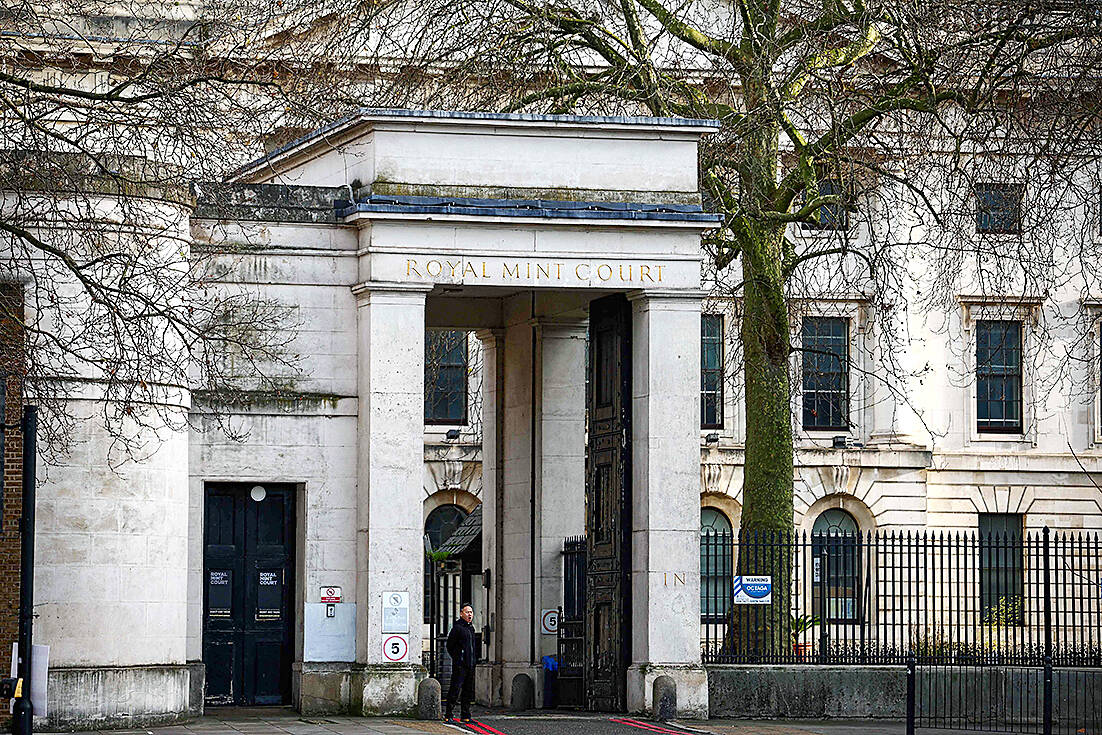As Britain’s new Labor government bids to reset long-fraught ties with China amid a suspected spy scandal, another issue could mar relations: Beijing’s controversial plans to open the largest embassy in the UK. China has for several years been trying to relocate its embassy, currently in the British capital’s upmarket Marylebone district, to a sprawling historic site in the shadow of the Tower of London.
The move east to the complex opposite the UNESCO World Heritage site housing the Tower, and adjacent to the iconic Tower Bridge, has sparked fierce opposition from nearby residents, rights groups, China-hawks and others.
Already rejected by local officials, it now appears to be a key issue in bilateral ties, and featured in early talks between President Xi Jinping (習近平) and Prime Minister Keir Starmer. It comes amid a new row over allegations of suspected spying by a Chinese businessman with links to Prince Andrew.

Photo: AFP
The British leader, elected in July, wants more engagement with Beijing, following years of deteriorating relations over various issues, in particular China’s rights crackdown in Hong Kong.
Last month Starmer became the first UK prime minister since 2018 to meet Xi, when the pair held talks at the G20 in Brazil. With TV cameras rolling, he said that Xi had raised the embassy in an earlier call and reassured him that his government had “taken action” by “calling in” its embassy application.
The decision means a national planning inspector will now hold a public inquiry into the scheme, but Communities Secretary Angela Rayner will make the final decision.
Governments can “call in” developments on various grounds, including issues going beyond “local importance” and impacting other governments or national security.
‘SHOCKED’
Despite Starmer also telling Xi that “we have to follow the legal process and timeline,” the intervention has unnerved opponents of the new embassy.
“I was a bit shocked,” said exiled Hong Kong dissident Simon Cheng (鄭文傑), who lives near the proposed embassy.
“I knew that China’s... plans would be quite important [in bilateral relations]. I hadn’t ever thought that it would be escalated to the top level.”
He worries Starmer’s emphasis on economic growth, and improved China ties, could trump other considerations.
A former British consulate staffer in Hong Kong granted UK asylum after allegedly being tortured by Chinese secret police, Cheng also fears “massive surveillance” at the new site. Housing the Royal Mint — the official maker of British coins — for nearly two centuries, it was earlier home to a 1348-built Cistercian abbey but is currently derelict.
Beijing bought the site for a reported US$327 million in 2018.
It comprises several “listed buildings” of historical note, and before the government’s intervention, any changes had required permission from the local authority, Tower Hamlets Council.
In 2022 its councilors unanimously rejected China’s plans, which include designs by the renowned David Chipperfield Architects firm. In July, Beijing resubmitted the proposals almost entirely unchanged. Conservative councilor Peter Golds has been a persistent opponent.
“Can you imagine the French or the Italians permitting the most famous World Heritage site in their country to have a gigantic embassy next to it? And not just any embassy!” he said.
“It’s a prestige site... it’d be a bit like us going to the Forbidden City,” he added, referring to Beijing’s imperial palace complex. “What an insult!”
‘OVERPOWERING’
The site adjoins a housing complex, and residents are most concerned about security implications.
“A small explosion from a car or a van would cause devastation,” Dave Lake, who leads a residents’ association fighting the plans, said, voicing concerns that the embassy could become a focus of anti-China protests.
Residents recently began fundraising to pay for the legal representation now needed to maintain what Lake considers a David-versus-Goliath battle.
“It’s overpowering — it’s almost as if they’re stamping on you,” he said.
There are reports Beijing intends to link the issue with British plans to redevelop its embassy and ambassador’s residence there.
A Chinese embassy statement said “host countries have the international obligation to support and facilitate the building of the premises of diplomatic missions.”
It added approval would help promote “friendship between the Chinese and British people and the development of bilateral relations.”
James Jennion, associate fellow at the British Foreign Policy Group, said it was “clearly a priority” for China, noting embassies are “status symbols.”
He added the government “calling in” the application “made this more of a ‘bilateral issue’ as well as likely creating future “domestic headaches.”
“This will make it tougher to assess based on practical factors, and will certainly be a defining feature of UK-China relations until a decision is made.”

Under pressure, President William Lai (賴清德) has enacted his first cabinet reshuffle. Whether it will be enough to staunch the bleeding remains to be seen. Cabinet members in the Executive Yuan almost always end up as sacrificial lambs, especially those appointed early in a president’s term. When presidents are under pressure, the cabinet is reshuffled. This is not unique to any party or president; this is the custom. This is the case in many democracies, especially parliamentary ones. In Taiwan, constitutionally the president presides over the heads of the five branches of government, each of which is confusingly translated as “president”

Sept. 1 to Sept. 7 In 1899, Kozaburo Hirai became the first documented Japanese to wed a Taiwanese under colonial rule. The soldier was partly motivated by the government’s policy of assimilating the Taiwanese population through intermarriage. While his friends and family disapproved and even mocked him, the marriage endured. By 1930, when his story appeared in Tales of Virtuous Deeds in Taiwan, Hirai had settled in his wife’s rural Changhua hometown, farming the land and integrating into local society. Similarly, Aiko Fujii, who married into the prominent Wufeng Lin Family (霧峰林家) in 1927, quickly learned Hoklo (commonly known as Taiwanese) and

The Venice Film Festival kicked off with the world premiere of Paolo Sorrentino’s La Grazia Wednesday night on the Lido. The opening ceremony of the festival also saw Francis Ford Coppola presenting filmmaker Werner Herzog with a lifetime achievement prize. The 82nd edition of the glamorous international film festival is playing host to many Hollywood stars, including George Clooney, Julia Roberts and Dwayne Johnson, and famed auteurs, from Guillermo del Toro to Kathryn Bigelow, who all have films debuting over the next 10 days. The conflict in Gaza has also already been an everpresent topic both outside the festival’s walls, where

The low voter turnout for the referendum on Aug. 23 shows that many Taiwanese are apathetic about nuclear energy, but there are long-term energy stakes involved that the public needs to grasp Taiwan faces an energy trilemma: soaring AI-driven demand, pressure to cut carbon and reliance on fragile fuel imports. But the nuclear referendum on Aug. 23 showed how little this registered with voters, many of whom neither see the long game nor grasp the stakes. Volunteer referendum worker Vivian Chen (陳薇安) put it bluntly: “I’ve seen many people asking what they’re voting for when they arrive to vote. They cast their vote without even doing any research.” Imagine Taiwanese voters invited to a poker table. The bet looked simple — yes or no — yet most never showed. More than two-thirds of those